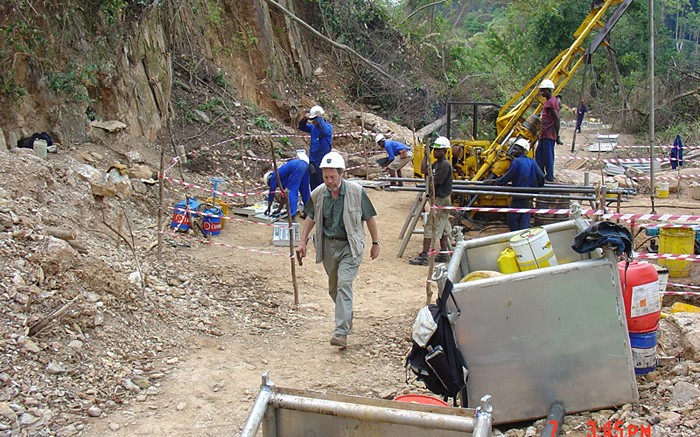Wherever this Canadian mining company goes in Congo, violence seems to follow

Banro operates in a region that has seen incredible violence over the past two decades and the secretive company has been accused of fuelling the conflict. In 1996 Banro paid $3.5 million for 47 mining concessions that covered more than one million hectares of land in Congo’s North and South Kivu.
Last week a police officer and a soldier were killed at a Banro Corporation-run mine in the east of the Democratic Republic of Congo. One “assailant” was also killed at the Toronto-based company’s Namoya mine.
In February three police officers were killed at another Banro mine about 200 km to the southwest. An “assailant” was also killed at Twangiza in what the gold mining firm labeled an attempted robbery.
In March five Banro employees from Tanzania, France and the Congo were kidnapped at Namoya. Four of them were released over the weekend by a militia that had apparently been threatening the company for months. Claiming Banro expropriated their lands, the population near its Namoya mine want restitution so they can continue small-scale mining. A 2013 Jesuit European Social Center report pointed out that local communities have not been allowed to see the environmental impact study or community plan for the mine and said the company paid the central government a million dollars for a tax exemption.
Banro operates in a region that’s seen incredible violence over the past two decades and the secretive company has been accused of fuelling the conflict. In 1996 Banro paid $3.5 million for 47 mining concessions that covered more than one million hectares of land in Congo’s North and South Kivu provinces. At the time over one million refugees were in eastern Congo and in September 1996 Rwandan (and Ugandan) forces invaded the area.
Resources fuelled the Rwandan/Ugandan invasion. Prominent Belgian Great Lakes journalist Colette Brackman produced a map showing that the zigzag progression of the Rwandan backed rebels was based on the location of minerals. Multinationals signed deals worth billions of dollars with Laurent Kabila’s rebels before he took office.
In an article headlined “Mining Firms Want a Piece Of Zaire's Vast Mineral Wealth” the Wall Street Journal explained: “At a time when rebel forces are threatening to topple dictator Mobutu Sese Seko, Zaire’s vast mineral resources are beckoning foreign companies, prompting a scramble that recalls the grab for wealth 120 years ago in this vast land, once known as the Congo. American, Canadian and South African mining companies are negotiating deals with the rebels controlling eastern Zaire. These companies hope to take advantage of the turmoil and win a piece of what is widely considered Africa’s richest geological prize — and one of the richest in the world.”
Ultimately, the Rwandan forces marched 1,500 km to topple the regime in Kinshasa. After the Congolese government installed by Kigali expelled Rwandan troops they re-invaded, leading to an eight-country war between 1998 and 2003, which left millions dead. Since then Rwanda and its proxies have repeatedly invaded the eastern Congo. At the end of 2012 the Globe and Mail’s Geoffrey York described how “Rwandan sponsored” M23 rebels “hold power by terror and violence” in the mineral rich east. The rebel group added “a [new] layer of administrators, informers, police and other operatives” in and around Goma, the capital of North Kivu province, in part to “bolster” its “grip on the trade in ‘blood minerals’.”
As one of the only western mining companies operating in the border provinces of North and South Kivu, Banro reportedly worked closely with the Rwandan government. Keith Harmon Snow claims that “Canadian Banro Corporation is one of the most secretive corporations operating in Congo, and they have established and maintained their control through very tight relations with the Kagame regime. Banro has taken over thousands of hectares of South Kivu province by manipulating the local mwamis (chiefs), by bribing officials and by infiltrating officials into power who are friendly to Banro and Kagame’s interests.”
Upon expelling Rwandan troops from the Congo in 1998, Laurent Kabila revoked Banro’s concessions. With all of its business activity in eastern Congo, the company responded by filing a $1 billion “unlawful” expropriation claim at the International Centre for Settlement of Investment Disputes in Washington. In “Digging Deeper: How the DR Congo’s Mining Policy is Failing the Country”, Dominic Johnson and Aloys Tegera explain:
“On 29 July 1998, just before war again started in Congo, President Laurent-Désiré Kabila annulled the Banro deal and gave ex-Sominki to a newly created Congolese state company called Somico (Société Minière du Congo) led by a Kivu traditional leader. Much of the subsequent fighting around Eastern Congo’s mining pitted Banro supporters, mostly supporting the [Rwandan backed] RCD rebels and backed by business interests, against Somico supporters, mostly consisting of Mai-Mai and supported by the Kabila government.”
Alongside the regional peace accord that officially ended the eight-country war in the Congo, Joseph Kabila (who took over after his father was assassinated) returned the concession to Banro in 2003.
Canadians have heard almost nothing from the dominant media about Banro’s violent quest for billions of dollars in minerals. The little that has been reported is mostly the company justifying its operations. But where are the voices of ordinary Congolese? Don’t they deserve to be heard?
Canadians need to know what this country’s mining companies are doing around the world.
* YVES ENGLER is the author of Canada in Africa: 300 years of aid and exploitation.
* THE VIEWS OF THE ABOVE ARTICLE ARE THOSE OF THE AUTHOR AND DO NOT NECESSARILY REFLECT THE VIEWS OF THE PAMBAZUKA NEWS EDITORIAL TEAM
* BROUGHT TO YOU BY PAMBAZUKA NEWS
* Please do not take Pambazuka for granted! Become a Friend of Pambazuka and make a donation NOW to help keep Pambazuka FREE and INDEPENDENT!
* Please send comments to [email=[email protected]]editor[at]pambazuka[dot]org[/email] or comment online at Pambazuka News.
